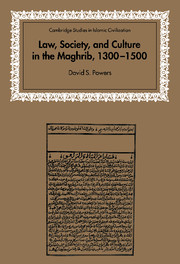Book contents
- Frontmatter
- Contents
- List of figures and tables
- Preface
- Introduction
- 1 Kadijustiz or Qāḍi-Justice? A Paternity Dispute from Fourteenth-Century Morocco
- 2 From Almohadism to Mālikism: The Case of al-Haskūrī, the Mocking Jurist, ca. 712-716/1312–1316
- 3 A Riparian Dispute in the Middle Atlas Mountains, ca. 683-824/1285–1421
- 4 Conflicting Conceptions of Property in Fez, 741–826/1340–1423
- 5 Preserving the Prophet's Honor: Sharīfism, Sufism, and Mālikism in Tlemcen, 843/1439
- 6 On Judicial Style: Two Fatwās on Tawlīj (ca. 880/1475)
- Conclusion: The Muftī
- Bibliography
- Index of Qur'ānic Verses
- Index of Prophetic Ḥadīth
- Index of Names
- Subject index
Introduction
Published online by Cambridge University Press: 05 July 2014
- Frontmatter
- Contents
- List of figures and tables
- Preface
- Introduction
- 1 Kadijustiz or Qāḍi-Justice? A Paternity Dispute from Fourteenth-Century Morocco
- 2 From Almohadism to Mālikism: The Case of al-Haskūrī, the Mocking Jurist, ca. 712-716/1312–1316
- 3 A Riparian Dispute in the Middle Atlas Mountains, ca. 683-824/1285–1421
- 4 Conflicting Conceptions of Property in Fez, 741–826/1340–1423
- 5 Preserving the Prophet's Honor: Sharīfism, Sufism, and Mālikism in Tlemcen, 843/1439
- 6 On Judicial Style: Two Fatwās on Tawlīj (ca. 880/1475)
- Conclusion: The Muftī
- Bibliography
- Index of Qur'ānic Verses
- Index of Prophetic Ḥadīth
- Index of Names
- Subject index
Summary
Drawing upon the legal rules and principles either stated in the Qur'ān and the prophetic sunna or capable of being derived from these two sources by analogical reasoning (qiyās) or juristic consensus (ijmā’), Muslim jurists have constructed the large and impressive corpus of legal rules and principles known as fiqh.
Since the last quarter of the nineteenth Century, western scholars have devoted considerable attention to the study of fiqh and its relevance to everyday life. An important pioneer in this enterprise was the Dutch Orientalist Snouck Hurgronje, who argued that the fiqh was not a System of law, strictly speaking, but a System of religious norms that seeks to promote an ideal society of believers by regulating the moral and ethical behavior of Muslims. The practical relevance of fiqh, Snouck Hurgronje said, was applied only to the areas of ritual law, personal Status, inheritance and endowments. A generation later the French Orientalist G.H. Bousquet characterized the fiqh as a System of religious duties in which human acts are classified as either obligatory, recommended, neutral, disapproved of, or forbidden. These views dominated western scholarship on Islamic law for much of the twentieth Century.
Writing at about the same time as Snouck Hurgronje, the Hungarian scholar Ignaz Goldziher advanced the idea that the fiqh was a System of law, albeit a “religious” law. Another scholar, the German sociologist Max Weber, characterized the fiqh as a “sacred law” that was irrational in two important respects.
- Type
- Chapter
- Information
- Law, Society and Culture in the Maghrib, 1300–1500 , pp. 1 - 22Publisher: Cambridge University PressPrint publication year: 2002
- 1
- Cited by



